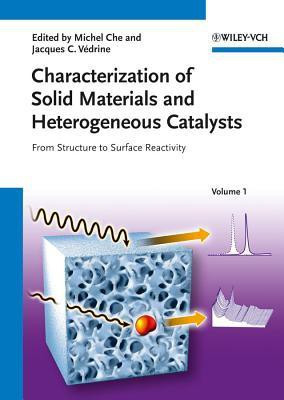Characterization of Solid Materials and Heterogeneous Catalysts, 2 Volume Set(English, Hardcover, unknown)
Quick Overview
Product Price Comparison
This two-volume book provides an overview of physical techniques used to characterize the structure of solid materials, on the one hand, and to investigate the reactivity of their surface, on the other. Therefore this book is a must-have for anyone working in fields related to surface reactivity. Among the latter, and because of its most important industrial impact, catalysis has been used as the directing thread of the book. After the preface and a general introduction to physical techniques by M. Che and J.C. V├®drine, two overviews on physical techniques are presented by G. Ertl and Sir J.M. Thomas for investigating model catalysts and porous catalysts, respectively. The book is organized into four parts: Molecular/Local Spectroscopies, Macroscopic Techniques, Characterization of the Fluid Phase (Gas and/ or Liquid), and Advanced Characterization. Each chapter focuses upon the following important themes: overview of the technique, most important parameters to interpret the experimental data, practical details, applications of the technique, particularly during chemical processes, with its advantages and disadvantages, conclusions. About the Author Michel Che studied chemistry and, after recruitment by CNRS, obtained his Doctorat ├©s Sciences (University of Lyon, F) in 1968. He worked as post-doc at Princeton University (USA) (1969-1971) and then as frequent visiting scientist at the Atomic Energy Research Establishment, Harwell (UK) (1972-1982). He became Professor at the University Pierre & Marie Curie, Paris in 1975 and Boris Imelik Chair Professor of Institut Universitaire de France in 1995. His research concerns spectroscopy, surface reactivity and heterogeneous catalysis. He was President-Founder of the European Federation of Catalysis Societies (starting the biennial Europacat congresses) and later of the International Association of Catalysis Societies. His scientific and educational work earned him several international awards, lectureships and honorary doctorates. Jacques C. V├®drine studied chemistry and, after recruitment by CNRS, obtained his Doctorat ├©s Sciences (University of Lyon, F) in 1968. He worked as post-doc in USA at Varian Associates, Palo-Alto (1969-70) and at Princeton University (1970-71). He was deputy director of the Institut de Recherches sur la Catalyse, CNRS in Lyon (1988-1998) and Chair Professor at Liverpool University, UK (1998-2003). He is one of the Editors of Appl. Catal. A: General. His research field covers physical techniques of catalyst characterization and heterogeneous catalysis for acid- and selective oxidation-type reactions on zeolites and mixed metal oxides. He was President of the European Federation of Catalysis Societies and of the Acid-Base World Organization. His scientific and educational work earned him several awards, and an honorary doctorate. Table of┬Ā Contents About the Editors Preface General Introduction Overview on Physical Techniques for Investigating Model Solid Catalysts Overview on Physical Techniques for Investigating Porous Catalysts Volume 1 Part One Molecular/Local Spectroscopies 1 Infrared Spectroscopy 2 Raman and UV-Raman Spectroscopies 3 Electronic Spectroscopy: Ultra Violet-visible and Near IR Spectroscopies 4 Photoluminescence Spectroscopy 5 Neutron Scattering 6 Sum Frequency Generation and Infrared Reflection Absorption Spectroscopy 7 Infra Red Reflection Absorption Spectroscopy and Polarisation Modulation-IRRAS 8 Nuclear Magnetic Resonance Spectroscopy 9 Electron Paramagnetic Resonance Spectroscopy 10 Mossbauer Spectroscopy 11 Low Energy Ion Scattering and Secondary Ion Mass Spectrometry 12 X-ray Absorption Spectroscopy 13 Auger Electron, X ray and UV Photoelectron Spectroscopies 14 Single Molecule Spectroscopy Volume 2 Part Two Macroscopic Techniques 15 X-Ray Diffraction and Small Angle X-Ray Scattering 16 Transmission Electron Microscopy 17 Scanning Probe Microscopy and Spectroscopy 18 Thermal Methods 19 Surface Area/Porosity, Adsorption, Diffusion Part Three Characterization of the Fluid Phase (Gas and/or Liquid) 20 Mass Spectrometry 21 Chromatographic Methods 22 Transient Techniques: Temporal Analysis of Products and Steady State Isotopic Transient Kinetic Analysis Part Four Advanced Characterization 23 Techniques Coupling for Catalyst Characterisation 24 Quantum Chemistry Methods Conclusions Index


